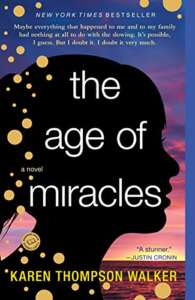 Discussion questions for The Age of Miracles by Karen Thompson Walker
Discussion questions for The Age of Miracles by Karen Thompson Walker
- What did you think about the difference (hatred?) between “real-timers” and “clock-timers”? Which would you have been? (“The real-timers made the rest of us uncomfortable. They too often slept while the rest of us worked. They went out when everyone else was asleep. They were a threat to the social order.”)
- Did the story seem to move slowly, almost languorously? Do you think that was a conscious decision on Walker’s part to echo the lengthening days and nights?
- The slowing takes place across the whole planet, but we only learn how it affects Southern California. How does the setting affect the book? How important it is that the story takes place in California?
- How do you feel about the way the book ends?
- If you woke up tomorrow to the news that the rotation of the earth had significantly slowed, how do you think you would respond? What is the first thing you would do?
- What did you think about the beginning? Did you find it believable the way Julia says she remembers so distinctly certain specifics of what was happening just before they heard about the slowing?
- Did you like the focus on the mundane aspects of how the slowing affected everyday life, or would you have preferred more of the scientific details?
- If you haven’t read it before, check out Ray Bradbury’s short story All Summer in a Day (and if you have read it, it’s worth reading again). How does this story compare to The Age of Miracles? Does reading either heighten your understanding of the other?
- The New York Times‘s reviewer says that: “What sets the story apart from more run-of-the-mill high-concept novels is Ms. Walker’s decision to recount the unfolding catastrophe from the perspective of Julia, who is on the verge of turning 12. Her voice turns what might have been just a clever mash-up of disaster epic with sensitive young-adult, coming-of-age story into a genuinely moving tale that mixes the real and surreal, the ordinary and the extraordinary with impressive fluency and flair.” Did you like Julia’s voice as a narrator? How would the book change if it were narrated by a different character? Julia’s father? Mother? Seth? Hanna?
- However, the same reviewer says that: “Ms. Walker sometimes seems so determined to use Julia’s circumscribed life as a microcosm of the larger world that the reader has to be reminded that ‘the slowing’ is supposedly a planet-altering phenomenon.” Did you find yourself forgetting that the slowing was happening to more than just Julia and her community?
For more questions, and an interview with the author, check out the publisher’s resources.

